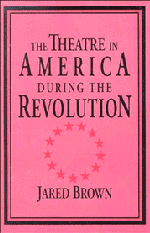Book contents
- Frontmatter
- Contents
- Preface
- Prologue
- SETTING THE STAGE: BEFORE THE REVOLUTION
- 1 The Drama of the Approaching Revolution
- 2 British Military Theatre, 1775–1777
- 3 Miscellaneous Diversions: Philadelphia, 1778
- 4 American Military Theatre and “Entertainments,” 1778
- SETTING THE STAGE: BRITAIN ASCENDANT
- SETTING THE STAGE: AMERICA ASCENDANT
- SETTING THE STAGE: AMERICA TRIUMPHANT
- Epilogue
- Appendix
- Notes
- Bibliography
- Index
4 - American Military Theatre and “Entertainments,” 1778
Published online by Cambridge University Press: 29 September 2009
- Frontmatter
- Contents
- Preface
- Prologue
- SETTING THE STAGE: BEFORE THE REVOLUTION
- 1 The Drama of the Approaching Revolution
- 2 British Military Theatre, 1775–1777
- 3 Miscellaneous Diversions: Philadelphia, 1778
- 4 American Military Theatre and “Entertainments,” 1778
- SETTING THE STAGE: BRITAIN ASCENDANT
- SETTING THE STAGE: AMERICA ASCENDANT
- SETTING THE STAGE: AMERICA TRIUMPHANT
- Epilogue
- Appendix
- Notes
- Bibliography
- Index
Summary
In october 1774, George Washington had signed the Congressional resolution intending to discourage the production of “shews, plays, and other expensive diversions and entertainments.” Washington, however, was no opponent of the theatre in peacetime; on the contrary, before the hostilities began he rarely missed an opportunity to see the American Company perform; and at Valley Forge in the spring of 1778, after the dreadfully cold weather had begun to ease, Washington relaxed whatever objections he may have had to the production of plays in wartime.
Valley Forge
A theatre was opened with Washington's approval and a play given at Valley Forge on April 15, 1778. Almost certainly his object was to provide his troops with some respite from the effects of the long and bitter winter rather than to satisfy his own interest in theatrical diversion. The only historical record of the theatre's opening was made in George Ewing's Military Journal, and Ewing, an American soldier, unfortunately neglected to mention the name of the play. He did note, however, that the performance was excellently attended:
This afternoon I received a ticket for the Play to be acted this evening at the Bakehouse in the evening went down in company with Major Bloomfield Lieuts Curtis Wayman & Kersey but the house was so full that I could not get in then a number of Gent went to Major Parkers hut in the fourth where we spent the evening very merily.
- Type
- Chapter
- Information
- The Theatre in America during the Revolution , pp. 57 - 68Publisher: Cambridge University PressPrint publication year: 1995

